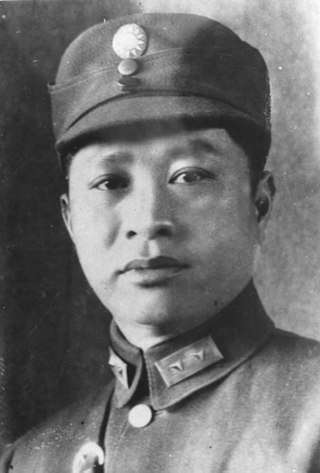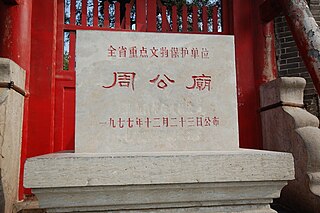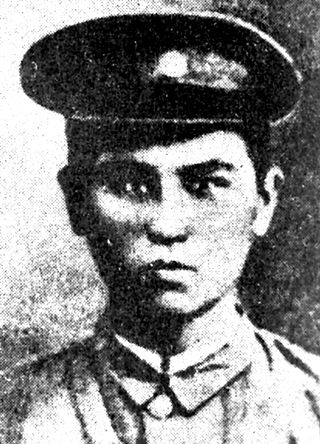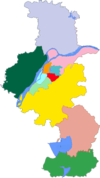
Hubei is a landlocked province of the People's Republic of China, and is part of the Central China region. The name of the province means "north of the lake", referring to its position north of Dongting Lake. The provincial capital, Wuhan, serves as a major transportation hub and the political, cultural, and economic hub of central China.
Chen Youliang was the founder and first emperor of the dynastic state of Chen Han in Chinese history. He was one of the military leaders and heroes of the people's revolution at the end of the Yuan dynasty.

Ye Ting, born in Huiyang, Guangdong, was a Chinese military leader who played a key role in the Northern Expedition to reunify China after the 1911 Revolution. After serving with the Kuomintang, Ye later joined the Communist Party of China (CPC).
The ranks in the Chinese People's Liberation Army Navy are similar to those of the People's Liberation Army Ground Force, except that those of the PLA Navy are prefixed by 海军 meaning Naval Force or Navy. See Ranks of the People's Liberation Army or the article on an individual rank for details on the evolution of rank and insignia in the PLAN. This article primarily covers the existing ranks and insignia.

ThePeople's Liberation Army National Defence University is a national public collegiate military university headquartered in Beijing, China with constituent and affiliated military academies nationwide. Established in 1985 by a military order of Deng Xiaoping, the university is under the "institutional leadership" of the Central Military Commission. The university is the highest military education institution of China.

Qiao Zhenyu is a Chinese actor who is a graduate of the Beijing Dance Academy.
Shangqiu Airport, or Shangqiu Air Base, is a military air base near the city of Shangqiu in China's Henan Province. It is located in Guantang Township, Liangyuan District, 16 kilometres (9.9 mi) west of the city center. The airport was built in the 1930s and was known as Gui'deAirbase, and served in national defense operations during the Sino-Japanese Conflict, and the planning is to convert the air base into a dual-use military and civil airport with an estimated investment of 500 million yuan. The airport is expected to serve 300,000 passengers and 1,000 tons of cargo per year by 2020.

The Major historical and cultural sites protected by Shandong Province are recognized on a list compiled by the Office for Cultural Heritage of Shandong Province. The sites on the list are determined by the provincial government and announced by the State Council of the People's Republic of China.

Abdulkerim Abbas, also Abdul Kerim Abbas, Abdulkerim Abbasoff, 'Abd al-Karīm 'Abbās, was a Uyghur leader in Xinjiang, China during the 20th century. He helped lead the Ili Rebellion of 1944, which led to the founding of the Second East Turkestan Republic in northern Xinjiang. Abbas, along with Ehmetjan Qasim, headed the Marxist faction within the Three Districts, which in 1946 set aside the rebellion's declaration of independence and joined the Nationalist Chinese in forming a coalition provincial government. Qasim and Abbas led the Three Districts in joining the Chinese Communists toward the end of the Chinese Civil War. They and several other senior leaders of the Three Districts perished in August 1949 in a plane crash while traveling en route to Beiping (Beijing) where they were invited to participate in the Chinese Communists' political consultative conference, which resulted in the founding of the People's Republic of China. Abbas is officially in hailed in the People's Republic of China as a revolutionary martyr.

Heroes of the Eastern Skies, is a Chinese war drama filmed in Taiwan, R.O.C. and based on the true story of a small group of Chinese flying aces in 1937 at the beginning of the Second Sino-Japanese War, specifically depicting events in the Battle of Shanghai, Battle of Nanking and the Battle of Taierzhuang; the movie was released on 7 July 1977 in commemoration of the 7/7 Incident which sparked the start World War II in Asia.
Order of Liberation was a Chinese military award awarded to heroes of the Liberation of mainland China during the Second Chinese Civil War between 3 September 1945 and 30 June 1950. There are three grades: First Class Medal, Second Class Medal, and Third Class Medal.
The August 1 Medal, sometimes known as the Order of Bayi, was a Chinese military award awarded to heroes of the Liberation of China during the First Chinese Civil War(that started on August 1st,1927). There are three grades: First Class, Second Class, and Third Class.

Huang Dao original name Huang Duanzhang, also known as Yiming was a member of the Chinese Workers' and Peasants' Red Army and the New Fourth Army. He was born in Hengfeng County, Jiangxi Province. He was the father of Huang Zhizhen, who was governor of Hubei Province under the People's Republic of China. He fought in the Chinese Civil War on the side of the Communist Party of China, being active in northern and eastern Fujian near the border with Zhejiang. He remained in southern China after the Long March. During the Second Sino-Japanese War, he was poisoned by the Kuomintang en route to southern Anhui.

Xu Jishen was a member of the Chinese Workers' and Peasants' Red Army. He was born in Lu'an, Anhui Province. In 1919, he participated in the May Fourth Movement. In 1920, he went to Anqing. In April 1921, he joined the Communist Youth League of China. In 1923, Xu left Anhui for Shanghai, enrolling in Shanghai University. In 1924, Xu entered the Whampoa Military Academy and joined the Communist Party of China. He quickly rose through the ranks from platoon commander to deputy company commander to company commander, ultimately rising to the rank of major. After the Zhongshan Warship Incident, he was made a battalion commander under Ye Ting. During his participation in the Northern Expedition, he was wounded due to the actions of Xia Douyin.

Duan Dechang was a member of the Chinese Workers' and Peasants' Red Army. He was born in Nan County, Yiyang, Hunan Province. He joined the Communist Youth League of China in June 1925 and the Communist Party of China in September 1925. He participated in the Northern Expedition. Around this time, he met Peng Dehuai. In August 1927, after the beginning of the Chinese Civil War between the communists and the Kuomintang, Duan participated in the Nanchang Uprising. After its defeat, he went to Gong'an County in Jingzhou, Hubei Province. In November 1931, he traveled from the Honghu Soviet in Hubei in Ruijin in the Jiangxi Soviet for a conference to coordinate the various Soviets. During the purges carried out by Xia Xi, Duan was one of those who died. He was killed in Badong County, Hubei. After requesting the executioners not to use bullets, he was put to death by the sword.
Wu Gang is a Chinese actor. He is known for his roles in Red Firecracker, Green Firecracker (1994), and Iron Man (2009) for which he won both Golden Rooster Award for Best Actor and Shanghai Film Critics Award for Best Actor.

The Transfer of People's Volunteer Army soldiers' remains from South Korea to China is the ongoing handover of remains of personnel of the Chinese People's Volunteer Army after the ceasefire of the Korean War. Following an agreement between South Korea and China, the remains of Chinese People's Volunteer Army personnel buried in South Korea are regularly exhumed and handed over. So far, the remains of 913 personnel have been handed over on nine occasions.

The Army Command College of the Chinese People's Liberation Army is an educational institution administered by the People's Liberation Army of the People's Republic of China, based in the city of Nanjing. It serves as a command academy that trains army commanders in the PLA Ground Forces. The college is among the most esteemed military academies in China. Since 1957, it has undertaken the task of providing long-term military training to foreign officers.
















